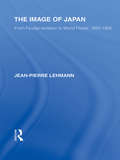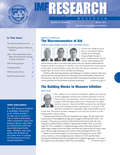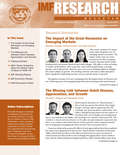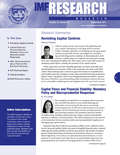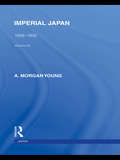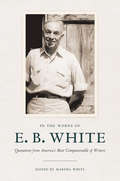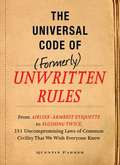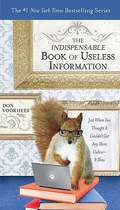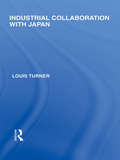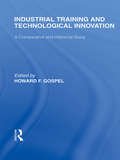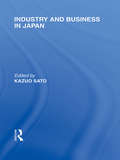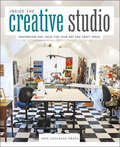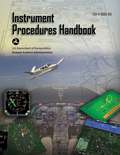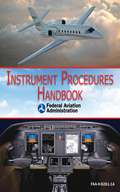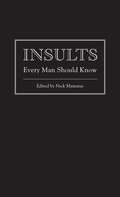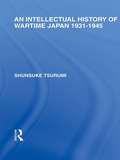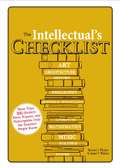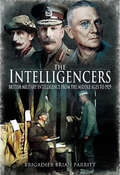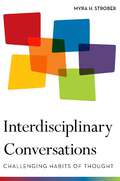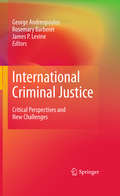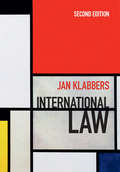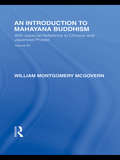- Table View
- List View
The Image of Japan: From Feudal Isolation to World Power 1850-1905 (Routledge Library Editions: Japan)
by Jean-Pierre LehmannJapan's image has experienced numerous transmutations. The book covers the metamorphosis from Japan's image of a feudal, exotic and romantic land inhabited by Madam Butterflies, to its sudden emergence as a geopolitical power following its defeat of Russia in 1905. More was to come. In the 1930s and 40s the image of the kamikaze vividly illustrated the fanaticism and barbarity associated with Japan in World War II. With the 1964 Tokyo Olympics, Japan rejoined the international community as a friend and ally of the US. The next transmutation came in the 1980s when the Japanese economy appeared to be functioning on anabolic steroids and its continued ascent to take over the US was predicted. "Japanese management" became more than a science, almost a religion, among business schools and consultancies. Today there are two images: one is conveyed through manga, karaoke and the global fashion for sushi; the other is of an economically and demographically declining nation. Will this image correspond to Japan's swan song or are there more transmutations on the way? One constant in Japanese history and the image it has projected has been the country's constant ability to surprise.
Imperial Japan: 1926-1938 (Routledge Library Editions: Japan)
by A Morgan YoungA journalist on the Japan Chronicle for eleven years, the author collected in this volume the most significant current events for discussion. They include the financial crisis of 1927, hostilities with China and in particular Manchuria, Japan’s booming manufacturing industry, Japanese nationalism, Japan’s new empire and its place within the Far East and East Asia. Written from a Western perspective, the volume nonetheless presents a balanced view of Japan and its behaviour which only close observation and dealings with the Japanese people could make possible.
In the Words of E. B. White: Quotations from America's Most Companionable of Writers
by E. B. White"The time not to become a father is eighteen years before a world war."—E. B. White on fatherhood"I was lucky to be born abnormal. It ran in the family."—on luck"I would really rather feel bad in Maine than feel good anywhere else." —on Maine"The English language is always sticking a foot out to trip a man."—on language The author of Charlotte's Web and One Man's Meat, coauthor of The Elements of Style, and columnist for The New Yorker for almost half a century, E. B. White (1899–1985) is an American literary icon. Over the course of his career, White inspired generations of writers and readers with his essays (both serious and humorous), children's literature, and stylistic guidance. In the Words of E. B. White offers readers a delightful selection of quotations, selected and annotated by his granddaughter and literary executor, Martha White. The quotations cover a wide range of subjects and situations, from Automobiles, Babies, Bees, City Life, and College to Spiders, Taxes, Weather, Work, and Worry. E. B. White comments on writing for children, how to tell a major poet from a minor one, and what to do when one becomes hopelessly mired in a sentence. White was apt to address the subject of security by speaking first about a Ferris wheel at the local county fair, or the subject of democracy from the perspective of roofing his barn and looking out across the bay—he had a gift for bringing the abstract firmly into the realm of the everyday. Included here are gems from White's books and essay collections, as well as bits from both published and unpublished letters and journals. This is a book for readers and writers, for those who know E. B. White from his "Notes and Comment" column in The New Yorker, have turned to The Elements of Style for help in crafting a polished sentence, or have loved a spider's assessment of Wilbur as "Some Pig." This distillation of the wit, style, and humanity of one of America's most distinguished essayists of the twentieth century will be a welcome addition to any reader's bookshelf.
The Incontrovertible Code of (Formerly) Unwritten Rules
by Quentin ParkerNever hog both armrests when you fly.Doorways, staircases, and elevator entrances are inappropriate spots to stop and chitchat.Always remember that one's own poop does, in fact, stink.When you borrow someone's car, fill it up with gas before you give it back.These are the unwritten rules of life. Observe them, and one rises above the great unwashed. Observe them not, and one goes straight to trailer trash.In this hilariously civil guide, you'll learn all of the principles of politesse our mothers tried to teach us--but some of us just weren't listening. So listen up, because our mothers were right: Handsome is as handsome does. If you never really understood what that meant--and who did?--then this book is for you. The Universal Code of (Formerly) Unwritten Rules: Because some rules should never be broken.
The Incontrovertible Code of (Formerly) Unwritten Rules: From Airline- Armrest Etiquette to Flushing Twice, 251 Universal Laws of Common Civility that We Wish Everything Knew
by Quentin ParkerNever hog both armrests when you fly.Doorways, staircases, and elevator entrances are inappropriate spots to stop and chitchat.Always remember that one's own poop does, in fact, stink.When you borrow someone's car, fill it up with gas before you give it back.These are the unwritten rules of life. Observe them, and one rises above the great unwashed. Observe them not, and one goes straight to trailer trash.In this hilariously civil guide, you'll learn all of the principles of politesse our mothers tried to teach us--but some of us just weren't listening. So listen up, because our mothers were right: Handsome is as handsome does. If you never really understood what that meant--and who did?--then this book is for you.The Universal Code of (Formerly) Unwritten Rules: Because some rules should never be broken.
The Indispensable Book of Useless Information
by Don VoorheesNothing you'll ever need to know is in this book The #1 New York Times bestselling series continues to prove that there are plenty of things in this world no one needs to know about. Why bother learning that. . . * Poland sells a drink called Fart Juice? * ATMs in Vatican City are in Latin? * a two-year-old learns about ten new words a day? * President George Washington checked out two library books that are now 220 years overdue? Do you really need to know. . . * how many clocks are in the Pentagon? * which state has towns called Intercourse and Virginville? * what WD-40 stands for? * the state with the fastest drivers?
Industrial Collaboration with Japan (Routledge Library Editions: Japan)
by Louis TurnerThis study looks at the experiences of European and American companies that have collaborated with their Japanese competitors in the fields of computers, consumer electronics, automobiles and aero-engines, by forming joint ventures, designing products together and pursuing complementary marketing strategies. It examines why these companies have chosen to collaborate rather than compete; whether the Japanese companies have proved to be reliable partners; whether the non-Japanese have been left behind; and what the future of such collaboration may be. The book concludes by pointing to a growing interest among non-Japanese companies in investing and collaborating within Japan itself.
Industrial Training and Technological Innovation: A Comparative and Historical Study (Routledge Library Editions: Japan)
by Howard F. GospelTaking an international and comparative perspective, this book focuses on the relationship between industrial training and technological change in three major global economies – the UK, USA and Japan. The contributors, an international group of leading researchers, look at the origins and development of training in these countries, and analyse the benefits resulting from the interaction of a skilled workforce and technological change. This analysis of training in major industrial nations reveals the full complexity of the relationship between labour and technological change. It shows the value of an approach which is both historical and comparative, and highlights the importance of education and training as a necessary basis for successful innovation.
Industry and Business in Japan (Routledge Library Editions: Japan)
by Kazuo SatoThis volume analyzes Japan’s industrial organization both from a historical perspective and by looking in details at specific industries such as iron, steel and the automotive industry. Big business, business groups and industrial policy are also discussed. The volume also provides a survey of the literature in Japanese which will help the reader in search of original sources.
Inside the Creative Studio: Inspiration and Ideas for Your Art and Craft Space
by Cate Coulacos PratoInside the Creative Studio is your ticket to turn your vision of a dream studio space into a reality.The professional artists and crafters of Studios Magazine give you the tools to create your own one-of-a-kind artistic environment in this best-of compilation. Learn how to find space in your home, whittle down your stash, maximize your storage and organization possibilities, and manage your stash of supplies and equipment to keep your work space functional and fun to work in. Experts will also show you how to repurpose furniture, integrate recyclables, and showcase vintage items to establish a space with purpose and personality. You will spend less time struggling with your studio, or lack thereof, and more time actually creating in your unique space.Regardless of your time, money, or space, Inside the Creative Studio offers charming and innovative solutions for every lifestyle. Artists and crafters of all types, including quilters, fiber artists, mixed-media artists, jewelry makers, sewists, painters, writers, bloggers, and more, share their stories, tips, and studios. Beautiful photographs and friendly dialogue walk you through these active spaces as if you were getting your own private tour. From spacious oases to cute and compact retreats, each space offers countless inspirational ideas.With some of the best articles and creative inspiration from Studios Magazine, Inside the Creative Studio offers everything you need to know to spend less time fussing with your space and more time enjoying your creative work.
Instrument Procedures Handbook: FAA-H-8083-16A (FAA Handbooks Ser.)
by Federal Aviation AdministrationThis is the new 2015 edition of the FAA's previous "Instrument Procedures Handbook" (previously the FAA-H-8083-16).This book covers all of the information needed to operate safely within the airspace system. In the FAA's "Instrument Procedures Handbook" (#FAA-H-8083-16A) the emphasis is placed on operations and procedural information for real-world use, which makes this the next logical step for pilots after learning basic instrument skills from the FAA's "Instrument Flying Handbook" (#FAA-H-8083-15B). Using this book, pilots can more directly apply the concepts to their current flying situation, and learn how their acquired skills are best used in today’s IFR environment. Considered industry-wide as a top source for instrument procedures information and a "must read” for all instrument pilots, this new 2015 edition brings pilots the latest changes to procedures and even more insights and guidance on how to operate safely within the national airspace system. Detailed information is provided for every navigation receiver and phase of flight on the required precision necessary to stay within protected airspace and to make a successful approach.While it was designed as a reference for professional pilots, the specialized glossary, index, full-color illustrations and photographs in this book make it a valuable training aid for flight instructors, instrument pilots, and instrument students alike. Each topic covered is well-detailed and explained in user-friendly terms, along with full-color depictions to aid understanding.Instrument flight instructors, pilots, and students will need this resource since it is used as a reference for the Airline Transport Pilot and Instrument Knowledge Tests and for the Practical Test Standards. Whether a pilot is a seasoned professional or recently completed an Instrument Rating course, this FAA handbook is sure to encourage more precise instrument techniques and ultimately create a safer pilot.
Instrument Procedures Handbook: Faa-h-8083-16a (FAA Handbooks Ser.)
by Federal Aviation AdministrationDesigned as a technical reference for instrument-rated pilots who want to maximize their skills in an "Instrument Flight Rules” environment, this revised and up-to-date edition of the Federal Aviation Administration’s Instrument Procedures Handbook contains the most current information on FAA regulations, the latest changes to procedures, and guidance on how to operate safely within the National Airspace System in all conditions. Featuring an index, an appendix, a glossary, full-color photos, and illustrations, Instrument Procedures Handbook is the most authoritative book on instrument use anywhere.
Insults Every Man Should Know (Stuff You Should Know #7)
by Nick MamatasHard-Hitting Insults for Every OccasionIncluding * Insulting Someone's Intelligence * Insulting Someone's Sexual Prowess * Insults for the Office * Insults on Game Day * Insults throughout History * Insults from around the WorldPlus insulting gestures, backhanded compliments, comebacks, all the things you should never say about someone's mama, and much more!From the Hardcover edition.
An Intellectual History of Wartime Japan: 1931-1945 (Routledge Library Editions: Japan)
by Shunsuke TsurumiWhen this book was published in Japanese in 1982 it was awarded the prestigious Jiro Osaragi Prize. It is an important contribution to the understanding of the mental and spiritual world of Japan just over two generations ago. The author argues that just as the period of isolation up to the middle of the 19th century was crucial for Japan’s development, so the Second World War represented another crucial period for the country. These years were a period of intellectual isolation during which significant development took place.
The Intellectual's Checklist
by James V. Wallace Richard J. WallaceCan you name: All five movements of Beethoven's Missa solemnis. Check. The films that Kurosawa based on Western works. Check. Dante's Nine Circles of Hell. Check. If so, you're off to an edifying start--but that's just round one in this hard-hitting match of wits and wisdom. Take the formidable plunge--and find out if you are truly well versed enough to call yourself an aspiring pundit, poet, and philosopher. Either way, you'll be worthy of the esteemed moniker intellectual by the time you've gone the distance with this book. (As Thoreau is our witness.) Whether you are just beginning to suspect you're the possessor of superior acumen or you'd bet your Homeric Greek translation of The Iliad on it, this book is an essential addition to any personal library.
The Intellectual's Checklist
by Richard J WallaceCan you name:All five movements of Beethoven's Missa solemnis. Check.The films that Kurosawa based on Western works. Check.Dante's Nine Circles of Hell. Check.If so, you're off to an edifying start--but that's just round one in this hard-hitting match of wits and wisdom. Take the formidable plunge--and find out if you are truly well versed enough to call yourself an aspiring pundit, poet, and philosopher. Either way, you'll be worthy of the esteemed moniker intellectual by the time you've gone the distance with this book. (As Thoreau is our witness.)Whether you are just beginning to suspect you're the possessor of superior acumen or you'd bet your Homeric Greek translation of The Iliad on it, this book is an essential addition to any personal library.
The Intellectual's Checklist
by Richard J. Wallace James V. WallaceAll five movements of "Beethoven's Missa" solemnis. Check. The films that Kurasawa based on Western works. Check. Dante's "Nine Circles of Hell". Check. These are the sorts of elegant erudition every self-respecting intellectual should know - inside and out. In "The Intellectual's Checklist", aspiring pundits, poets, and philosophers find the arcane checklists that reveal whether they are truly well-versed enough in the arts and sciences of the obscure to warrant the esteemed moniker "Intellectual". From Nietzsche to Newton, Einstein to Eisenstadt, Sappho to Sartre, this elucidating volume gives readers all the esoterica they need to bask in the knowledge that they really do know everything. (Now that they've read this book. )
The Intelligencers: British Military Intelligence From the Middle Ages to 1929
by Brian ParrittIntelligence about the enemy is a fundamental part of any war or battle; knowledge of the enemys strength, dispositions and intentions are essential for success. This book reveals that for 250 years the British Army resolutely failed to prepare for war by refusing to establish a nucleus of soldiers in peace, trained to obtain intelligence in war. Although there were Scoutmasters and secret spy organizations such as Walsinghams in the 15th Century, in no major conflict from the Civil War of 1642, including the Peninsula, the Crimea, Burma, Egypt and South Africa and in the multitude of small wars that gained Britain an empire, was there any staff branch or unit specifically pre-established to gain intelligence or frustrate the enemy from obtaining intelligence. Yet the story of British military endeavor over 250 years is a remarkable story of individuals bravery, achievement and success. We read of the Scoutmaster whose role was to gather intelligence on the Kings enemies and of Walsinghams secret organization at the time of Elizabeth I. During the long years of war against France culminating in the Napoleonic Wars, spy masters developed on an ad hoc basis. In the Nineteenth Century, despite the power and reach of Empire, no central intelligence organization existed. Enterprising young officers worked wonders but failures such as those in the Boer War cost the Nation dearly. It took the reverses in the Great War to create an Intelligence Corps. But even that was disbanded postwar.
Interdisciplinary Conversations: Challenging Habits of Thought
by Myra H. StroberInterest in doing, funding, and studying interdisciplinary work has built to crescendo in recent years. But despite this growing enthusiasm, our collective understanding of the dynamics, rewards, and challenges of faculty conversations across disciplines remains murky. Through six case studies of interdisciplinary seminars for faculty, Interdisciplinary Conversations investigates pivotal interdisciplinary conversations and analyzes the factors that make them work. Past discussions about barriers to interdisciplinary collaborations fixate on funding, the academic reward system, and the difficulties of evaluating research from multiple fields. This book uncovers barriers that are hidden: disciplinary habits of mind, disciplinary cultures, and interpersonal dynamics. Once uncovered, these barriers can be broken down by faculty members and administrators. While clarion calls for interdisciplinarity rise in chorus, this book lays out a clear vision of how to realize the creative potential of interdisciplinary conversations.
International Criminal Justice
by Rosemary Barberet James P. Levine George AndreopoulosIn recent years, justice-related and human rights issues have figured more and more prominently on the international political agenda. This expansion of the justice space is a product of a growing demand for accountability in world politics. Whether the issue is addressing heinous crimes such as genocide, war crimes and crimes against humanity in situations of armed conflict, confronting the inability or reluctance of governments to protect their own populations, or responding to the challenges posed by transnational terrorism; the international community has witnessed the proliferation of institutions and mechanisms, as well as the dynamic interplay between domestic and international processes, in the pursuit of justice-sensitive outcomes. International and hybrid tribunals, UN-led and domestic counter-terrorist initiatives, and the use of force for human protection purposes have demarcated the space within which ethical, political, and legal debates have unfolded in the quest for a more humane world order. The contributors of International Criminal Justice: Theoretical and Legal Perspectives address some of the most important issues and debates involved in this quest, and assess the merits of contending approaches to the promotion of international justice norms. This volume will contribute to the ongoing debate on the challenges, as well as opportunities, facing the justice agenda in its effort to shape developments in an increasingly interdependent world.
International Law
by Jan KlabbersThe Finnish Yearbook of International Law aspires to honour and strengthen the Finnish tradition in international legal scholarship. Open to contributions from all over the world and from all persuasions, the Finnish Yearbook stands out as a forum for theoretically informed, high-quality publications on all aspects of public international law, including the international relations law of the European Union. The Finnish Yearbook publishes in-depth articles and shorter notes, commentaries on current developments, book reviews and relevant overviews of Finland's state practice. While firmly grounded in traditional legal scholarship, it is open for new approaches to international law and for work of an interdisciplinary nature. The Finnish Yearbook is published for the Ius Gentium Association (the Finnish Society of International Law) by Hart Publishing. Further information may be found at www. fybil. orgINDIVIDUAL CHAPTERSPlease click on the link below to purchase individual chapters from Volume 20 through Ingenta Connect:www. ingentaconnect. comSUBSCRIPTION TO SERIESTo place an annual online subscription or a print standing order through Hart Publishing please click on the link below. Please note that any customers who have a standing order for the printed volumes will now be entitled to free online access. www. hartjournals. co. uk/fyil/subs
An Introduction to Mahāyāna Buddhism: With especial Reference to Chinese and Japanese Phases (Routledge Library Editions: Japan)
by William M McGovernWilliam Montgomery McGovern’s Introduction to Mahayana Buddhism was one of the first books on Mahayana Buddhism written for a Western audience. It predates influential English language overviews of Buddhism by D. T. Suzuki, A. Watts, and W. Rahula. The author was born in New York City in 1897 and spent his latter teenage years (1914-1917) training at the Nishi Hongwanji Mahayana Buddhist monastery in Kyoto, Japan. He founded the Mahayana Association at age eighteen and edited and published the journal "Mahayanist" while completing his studies at the monastery. Introduction to Mahayana Buddhism was written as part of a thesis which secured him his Buddhist degree and an honorary ordination as a Buddhist priest. Intended as a simplified and introductory text for a lay audience, the book reflects the unique perspective of a Westerner trained in Japan at a time when Mahayana Buddhism was little known in the West. Referencing Buddhist literature, it gives a short history of Buddhism and the divergence of schools of Buddhist philosophy, introduces the four noble truths, the philosophy of Karma, the nature of Buddhahood, reincarnation and the road to nirvana, Buddhist cosmology, and psychological and philosophical elements of Buddhist teachings. Although the divisions of non Mahayana Buddhist sects and philosophy described may be considered dated, Introduction to Mahayana Buddhism remains significant for its historical value in presenting Eastern religious and philosophical thought to Westerners at a pivotal time in history.
